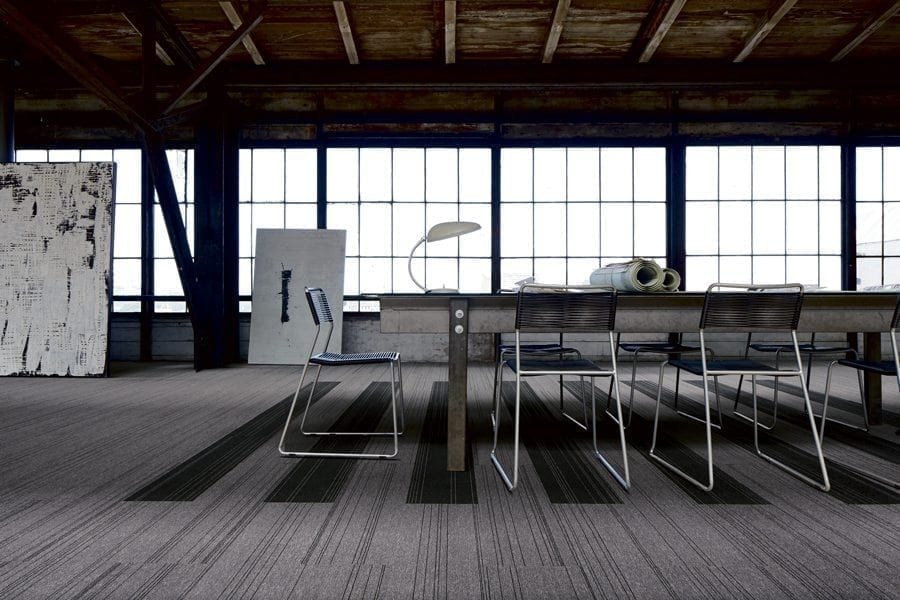Interface, the world’s largest global manufacturer of modular flooring, is no stranger to innovation. In the mid-nineties it became one of the first companies to make a public commitment to sustainability, pledging to eliminate its impact on the environment – completely – by 2020. The business has been in a constant cycle of reinvention ever since.
The latest breakthrough goes to show what can be achieved through commitment and constant self-assessment: Interface’s new Microsfera carpet tiles have the smallest carbon footprint of any in history.
‘The magic metric’
A carpet tile’s most significant environmental impact is its carbon footprint, which Interface calls ‘the magic metric’. By conducting its own life cycle assessments, the company found that most of the CO2 emitted by the carpet manufacturing industry comes from the raw materials used – mainly the yarn and the latex in the middle layer, known as the pre-coat.
Nylon yarn helps to ensure carpet tiles wear well and are easy to maintain, which are both essential when you’re kitting out large offices with high footfall. But the processing of virgin, oil-rich yarn is responsible for around 50% of a carpet tile’s total environmental footprint.
Breaking records
Back in 2000 Interface developed a new process that cut the amount of yarn used in its carpet tiles. These ‘Microtuft’ products, such as those in its Elevation III, use 50% less yarn than a conventional carpet – and the yarn that is used is made from 100% recycled nylon, reclaimed from old carpets and commercial fishing nets that have reached the end of their useful life. For three years these carpet tiles held the record for lowest carbon contribution.
Now Interface has found a way to fuse the yarn directly at the back, meaning polypropylene yarn can be used in a Microtuft construction with no need for a latex pre-coat.
The finished product, Microsfera, sets a new low-carbon record for carpet tiles; just 3kg of carbon is released per m2 produced – from the processing of raw materials right through to the finished product. That’s about a quarter of the CO2 released in the production of a typical carpet tile – and less than 5% of the 63kg of CO2/m2 released by an 80/20 wool/nylon broadloom carpet.
Living spaces
Volatile organic compound (VOC) emissions can create indoor air pollution, so Interface has made sure the VOCs in its Microsfera tiles are ultra-low. At 100μg/m³ after three days, they’re less than half of the maximum level outlined in the strict GUT (the Association of
Environmentally Friendly Carpets in Germany) standard for carpet.
The tiles are everything you’d expect from a company that manufactures beautiful, practical products that don’t cost the Earth. You get all the comfort and acoustic benefits of a carpet from a surface that requires no more maintenance than a traditional hard floor.
The colours in the range are bang on trend: industrial greys, denim-inspired blues and corrugated copper tones. They can be combined to transform and enrich spaces with striking designs that last.
 Play Video about This Rock Might Just Save The World
Play Video about This Rock Might Just Save The World Play Video about Play 2 hours of rock
Play Video about Play 2 hours of rock Play Video about Play 2 hours of brook
Play Video about Play 2 hours of brook Play Video about Play 2 hours of sheep
Play Video about Play 2 hours of sheep











































